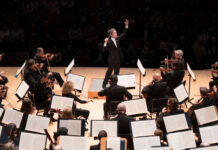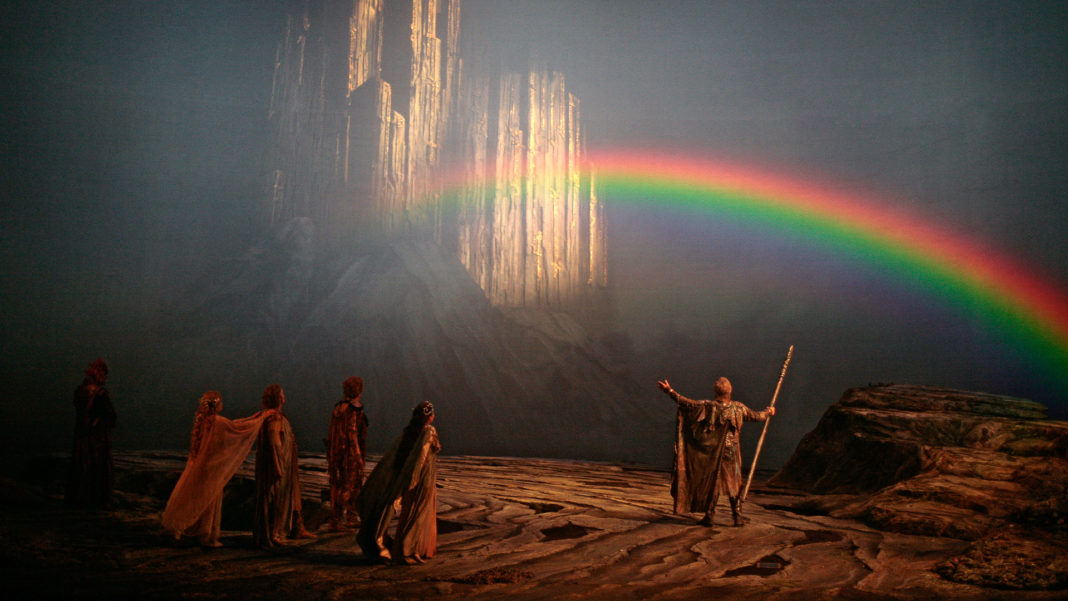The last full week in March found the Metropolitan Opera streaming an all-Wagner week. It must have been popular as Week 30 at the Met finds another week that showcases the operas of Richard Wagner.
There is a full Ring Cycle this week, but it is a different series of productions than ran in March. My favorite opera opens the week: Tristan und Isolde.
If you are not familiar with Wagner’s works, and even if you are, it is worth noting that with one exception, these are not short evenings. But they do offer truly astonishing music that rewards your investment of time.
Each production becomes available at 7:30 PM EDT/4:30 PM PDT on the Metropolitan Opera website. Every opera remains available for 23 hours. They are heavily promoting their Met Stars Live in Concert series and recently announced the cancellation of the full 2020-2021 season, so you’ll have to go past those announcements and promos to find the streaming productions. Schedules and timings may be subject to change.
If you read this column earlier enough on October 5th, you might still have time to catch the 2016-2017 season production of Idomeneo that concludes last week’s Mozart Week.
Here is the line-up for Week 30 at the Met:
Monday, October 5 – Wagner’s Tristan und Isolde
Conducted by Simon Rattle; starring Nina Stemme, Ekaterina Gubanova, Stuart Skelton, Evgeny Nikitin and René Pape. This Mariusz Trelinski production is from the 2016-2017 season. This is an encore presentation of the production that streamed on March 23rd.
Richard Wagner wrote the music and the libretto for Tristan and Isolde. Gottfried von Strassburg’s novel, Tristan, from the 12th century, serves as his inspiration. The opera had its world premiere in Munich in 1865.
It is a bit of oversimplifying to say that the story in Tristan und Isolde is about two lovers whose passion for each other is so strong, it can only truly thrive in the afterlife. But frankly, in a nutshell, that’s the essential premise. But don’t be mistaken, this is pure drama and glorious music.
Anyone who saw Nina Stemme in Richard Strauss’s Elektra that streamed on April 20th and August 31st know how fully-committed she is to the characters she sings. Anthony Tommasini, writing in the New York Times, hailed her performance here. “Her Isolde is just as outstanding. Her voice has enormous carrying power without any forcing. Gleaming, focused top notes slice through the orchestra. As Isolde went through swings of thwarted fury, yearning and despair, Ms. Stemme altered the colorings of her sound, from steely rawness to melting warmth. And it is not often you hear a Wagnerian soprano who takes care to sing with rhythmic fidelity and crisp diction.”
Tuesday, October 6 – Wagner’s Tannhäuser
Conducted by James Levine; starring Eva-Marie Westbroek, Michelle DeYoung, Johan Botha, Peter Mattei and Gunther Groissböck. This revival of Otto Schenk’s 1977 production is from the 2015-2016 season. This is an encore presentation of the production that streamed on March 29th.
Composer and librettist Richard Wagner combined two German legends for this opera that had its debut in Dresden in 1845. The first legend is that of the 13th century poet and minstrel singer, Tannhäuser, about whom little is known beyond his poetry. The other is the Wartburg Song Contest, a contest amongst minstrel singers in Wartburg, a castle that overlooks the German town of Eisenach.
In the opera the title character spends time with the gods, particularly Venus, and back in the real world where his lover Elizabeth has been waiting for him. A song contest is announced to win Elizabeth’s hand. Will Tannhäuser do the right thing to win Elizabeth or will his flirtation with Venus undermine his desires?
In his review for the New York Times, Anthony Tommasini raved about Botha in the title role. “This valuable artist is a reminder that singing comes first in opera. Mr. Botha has an awkwardly hefty physique and is no actor. It didn’t matter. His voice conveyed youthful yearning and, when Tannhäuser goes through a spiritual crisis, despair and confusion.”
Botha passed away in 2016.
Wednesday, October 7 – Wagner’s Das Rheingold
Conducted by James, Levine; starring Christa Ludwig, Siegfried Jerusalem, James Morris and Ekkehard Wlaschiha. This revival of Otto Schenk’s 1987 production is from the 1989-1990 season.
This is the first in Wagner’s Der Ring des Nibelungen (also known as The Ring Cycle). As with all four of these operas, Wagner wrote the music and the libretto. Das Rheingold had its world premiere in 1869 in Munich. It was premiered as a stand-alone opera. The first performance of the entire cycle was at Bayreuth in 1876.
Alberich is a dwarf who renounces love in his successful effort to take gold from the Rhinemaidens and have possession of a ring bestowing power to the wearer. With this one action, he sets in motion the storyline that runs through all four operas in the Ring Cycle. Fafner and Fasolt are the giants who built Valhalla. The long-suffering Wotan is introduced here as are the challenges the gods face in repaying the architects of Valhalla. When the ring is stolen from Alberich he puts a curse on it and on anyone who takes possession of it.
Allan Kozinn, writing for the New York Times, said of this production: “The Met’s production, by Otto Schenk, with sets by Gunther Schneider-Siemssen and costumes by Rolf Langenfass, has been controversial largely for being noncontroversial. At a time when other companies, particularly in Europe, are favoring updated stagings that show the cycle’s universal themes in different lights, the Met is playing the works by Wagner’s rules, presenting the tale in a naturalistic, primordial setting.”
Thursday, October 8 – Wagner’s Die Walküre
Conducted by James Levine; starring Hildegard Behrens, Jessye Norman, Christa Ludwig, Gary Lakes, James Morris and Kurt Moll. This revival of Otto Schenk’s 1986 production is from the 1988-1989 season.
This is the second opera in Wagner’s Der Ring des Nibelungen. It had its premiere as a stand-alone opera in 1870 in Munich.
The son of the god Wotan is a fugitive named Siegmund. When he finds himself taking refuge at Sieglinde’s house, the two fall passionately in love. But Sieglinde is married and in order for her and Siegmund to be together Siegmund must defeat her husband in a battle to the death.
This production marked the first time Jessye Norman sang the role of Sieglinde at the Met. In his review for the New York Times, Donal Henahan wrote of her performance, “Miss Norman, assuming her role for the first time at the Metropolitan, sang both richly and sensitively and entered into the character with the ease and skill of a veteran Wagnerian. Miss Behrens, never the most powerful of Brunnhildes vocally, had to finesse the music at times, but as in the past made an irresistible Valkyrie, the most ebullient of a particularly bouncy band of female warriors. As usual, some vocal struggle had to be overlooked in a performance that was a triumph of will, dramatic instinct and musicality. Miss Ludwig, in her best current voice in the crucial dialogue with Wotan, actually made a many-dimensional, sympathetic figure of the henpecking goddess.”
Friday, October 9 – Wagner’s Siegfried
Conducted by James Levine; starring Hildegard Behrens, Siegfried Jerusalem and James Morris. This Otto Schenk production is from the 1989-1990 season.
This third opera in Wagner’s Der Ring des Nibelungen had its premiere in Bayreuth in 1876 where it was seen at the first-ever performance of The Ring Cycle.
The title character is front and center in the third opera in the Ring Cycle. He matures throughout the opera via the choices he makes. He encounters an enigmatic Wanderer, but doesn’t know this is Wotan in disguise. When Siegfried is able to reassemble pieces of Siegmund’s sword (Siegmund is his father) he uses it to kill Fafner who has the responsibility of protecting the gold that was stolen from the Rhinemadiens in Das Rheingold. He also comes into possession of the ring. But what will he do with it and how will that impact his pre-destined love for Brunnhilde?
Whatever concerns Donal Henahan had about Hildegard Behrens in Die Walküre, his fellow critic at the New York Times, Bernard Holland, had a different perspective about her performance in Siegfried. “Yet Siegfried fully came to life with the appearance of Hildegard Behrens in Act III. She was a touching Brunnhilde, incorporating in a very different context Mr. Zednik’s earlier virtues. Miss Behrens’s big, gleaming soprano embraced this huge hall as if it were a space of much smaller dimensions. In her presence alone, she also has the powers of projection that convey exuberance and passion and make them seem intimate.”
Saturday, October 10 – Wagner’s Götterdämmerung
Conducted by James Levine; starring Hildegard Behrens, Christa Ludwig, Siegfried Jerusalem and Matti Salminen. This Otto Schenk production is from the 1989-1990 season.
The final opera in Der Ring des Nibelungen had its world premiere in 1876 in Bayreuth as part of the first-ever performance of The Ring Cycle.
Alberich’s curse placed on the ring and its owners comes to haunt the characters in this final opera in the Ring Cycle. Siegfried, having fallen in love with Brunnhilde, is convinced to consume a potion that renders him without memory. That lack of remembering finds him proposing to another woman, Gutrune. Her brother consents as long as Siegfried will allow him to marry Brunnhilde. The ring changes hands and with Alberich’s son, Hagen, manipulating the action, ruin comes to all, including the gods whose glory has come to an end leaving Valhalla in flames.
In his review for the New York Times, John Rockwell was particularly impressed with Siegfried Jerusalem, who was singing his first Siegfried in Götterdämmerung at the Met in this production. “For while Mr. Jerusalem is no heroic tenor in the Lauritz Melchior mold, he could be the best Siegfried since Wolfgang Windgassen. His voice may not be huge, but it is big enough. And his soft singing is really lovely: even toward the end on Saturday, the lyrical passages sounded controlled and warm. He sings with unusual sensitivity to the word, the musical phrase and the dramatic situation…”
Sunday, October 11 – Wagner’s Parsifal
Conducted by Daniele Gatti; starring Katarina Dalayman, Jonas Kaufmann, Peter Mattei and René Pape. This François Girard production is from the 2012-2013 season. This is an encore presentation of the production that streamed on April 9th.
Richard Wagner was inspired by Wolfram von Eschenbach’s poem about the knight Percival who was in search of the Holy Grail and served at King Arthur’s Round Table. Parsifal was the composer’s last completed opera. It had its world premiere in Bayreuth in 1882. Wagner wrote both the music and the libretto.
Young Parsifal is woefully unaware of right or wrong. He has no concept of sin nor redemption. Raised by his mother, he’s unfamiliar with the ways of the world. He meets one of the Knights of the Grail and is given the opportunity to see the Holy Grail. While at the Castle, he hears King Amfortas, crying in pain. Though Amfortas was given a life of immortality by the Grail, his pain comes from a wound inflicted by Klingsor who took the Holy Spear from the King. Parsifal makes it his mission to return the Spear and destroy Klingsor and his kingdom in order so that the King’s suffering can end.
Anthony Tommasini, in his New York Times review, praised Kaufmann’s performance as the title character. “At 43 Mr. Kaufmann is in his glory, equally adept in German, Italian and French repertory. Handsome and limber, he is a natural onstage. The baritonal colorings of his sound, his clarion top notes, the blend of virility and tenderness in his singing, his refined musicianship — all these strengths come together in his distinctive Parsifal.”
If you watch all seven of these productions, you will have completed a true opera marathon. Next week is an all-Donizetti week.
Enjoy the Wagner and enjoy your week.
Photo: A scene from Das Rheingold. (Photo by Beatriz Schiller/Courtesy Met Opera)











